HDLbits——移位寄存器
移位寄存器
1 4 位移位寄存器
module top_module(
input clk,
input areset, // async active-high reset to zero
input load,
input ena,
input [3:0] data,
output reg [3:0] q);
always @(posedge clk or posedge areset) begin
if (areset)
q<=4'h0;
else if(load)
q<=data;
else if(ena)
q[3:0]={1'b0,q[3:1]};
end
endmodule
2 100bit的可左移或右移的移位寄存器
设计一个100bit的可左移或右移的移位寄存器,附带同步置位和左移或右移的使能信号。本题中,移位寄存器在左移或右移时,不同于Problem106的补0和直接舍弃某一bit位,本题是要求在100bit内循环移动,不舍弃某一bit位同时也不补0。
module top_module(
input clk,
input load,
input [1:0] ena,
input [99:0] data,
output reg [99:0] q);
always @(posedge clk) begin
if(load)
q<=data;
else if(ena==2'b01)
q<={q[0],q[99:1]};
else if(ena==2'b10)
q<={q[98:0],q[99]};//对本身移位,是q不是datd
else if(ena==2'b00||ena==2'b11)
q<=q;
end
endmodule
3 一个64-bit带同步置位的算术移位寄存器
设计一个64-bit带同步置位的算术移位寄存器。该寄存器可以由amount控制来移动方向和每次移动的次数。
算术右移移位寄存器中的符号位(q [63])移位,不像是逻辑右移中进行补零的操作。而是保留符号位后再进行移位。
module top_module(
input clk,
input load,
input ena,
input [1:0] amount,
input [63:0] data,
output reg [63:0] q);
always @(posedge clk) begin
if (load)
q<=data;
else if (ena==1'b1 && amount==2'b00)
q<={q[62:0],1'b0};
else if (ena==1'b1 && amount==2'b01)
q<={q[55:0],8'b0};
else if (ena==1'b1 && amount==2'b10)
q<={q[63],q[63:1]};
else if (ena==1'b1 && amount==2'b11)
q<={{8{q[63]}},q[63:8]};
else if (ena==1'b0)
q<=q;
end
endmodule
4 Lfsr5
线性反馈移位寄存器(LFSR)是通常带有几个XOR门来产生下一状态的移位寄存器。Galois LFSR是一个特殊的移位寄存器。其中带有"tap"位的位置与输出位XOR产生下一个值没有"tap"位标志的正常移位。如果"tap"位置经过仔细选择后,LFSR将设置为最大长度。再重复之前LFSR的最大长度为2^n-1
module top_module(
input clk,
input reset, // Active-high synchronous reset to 5'h1
output [4:0] q
);
always @(posedge clk) begin
if(reset)
q<=5'h1;
else begin
q[4]<=0^q[0];
q[3]<=q[4];
q[2]<=q[3]^q[0];
q[1]<=q[2];
q[0]<=q[1];
end
end
endmodule
5 Mt2015 lfsr
module top_module (
input [2:0] SW, // R
input [1:0] KEY, // L and clk
output [2:0] LEDR); // Q
move move_1[2:0](.r(SW),
.q({LEDR[1]^LEDR[2],LEDR[0],LEDR[2]}),
.L({3{KEY[1]}}),.clk({3{KEY[0]}}),.Q(LEDR));
endmodule
module move(input r,input q,input L,input clk,output Q);
always @(posedge clk) begin
Q<=L?r:q;
end
endmodule
6 Lfsr32
抽头点为32,22,2,1。Build a 32-bit Galois LFSR with taps at bit positions 32, 22, 2, and 1.
module top_module(
input clk,
input reset, // Active-high synchronous reset to 32'h1
output reg [31:0] q
);
always@(posedge clk)begin
if(reset)
q <= 32'h1;
else begin
q <= {q[0],q[31-:9],q[22]^q[0],q[21:3],q[2]^q[0],q[1]^q[0]};
end
end
endmodule
7 shift register
实现下图中的电路
module top_module (
input clk,
input resetn, // synchronous reset
input in,
output out);
always @(posedge clk) begin
reg q1,q2,q3;
if (~resetn) begin
out<=1'b0;
q1<=1'b0;
q2<=1'b0;
q3<=1'b0;//注意reset后需要全部置0
end
else begin
q1<=in;
q2<=q1;
q3<=q2;
out<=q3;
end
end
endmodule
8 shift register
module top_module (
input [3:0] SW,
input [3:0] KEY,
output [3:0] LEDR
); //
MUXDFF MUXDFF1[3:0](.w({KEY[3],LEDR[3:1]}),.e({4{KEY[1]}}),.l({4{KEY[2]}}),.r(SW),.clk({4{KEY[0]}}),.Q(LEDR));
endmodule
module MUXDFF (input w,input e,input l,input r,input clk,output Q);
always@(posedge clk) begin
Q<=l?r:(e?w:Q);
end
endmodule
9 3-INPUT LTU
没写出来
module top_module (
input clk,
input enable,
input S,
input A, B, C,
output Z );
reg [7:0] q;
always @(posedge clk) begin
if (enable)
q<={q[6:0],S};
end
always @(*) begin
case ({A,B,C})
3'd0: Z=q[0];
3'd1: Z=q[1];
3'd2: Z=q[2];
3'd3: Z=q[3];
3'd4: Z=q[4];
3'd5: Z=q[5];
3'd6: Z=q[6];
3'd7: Z=q[7];
endcase
end
endmodule
